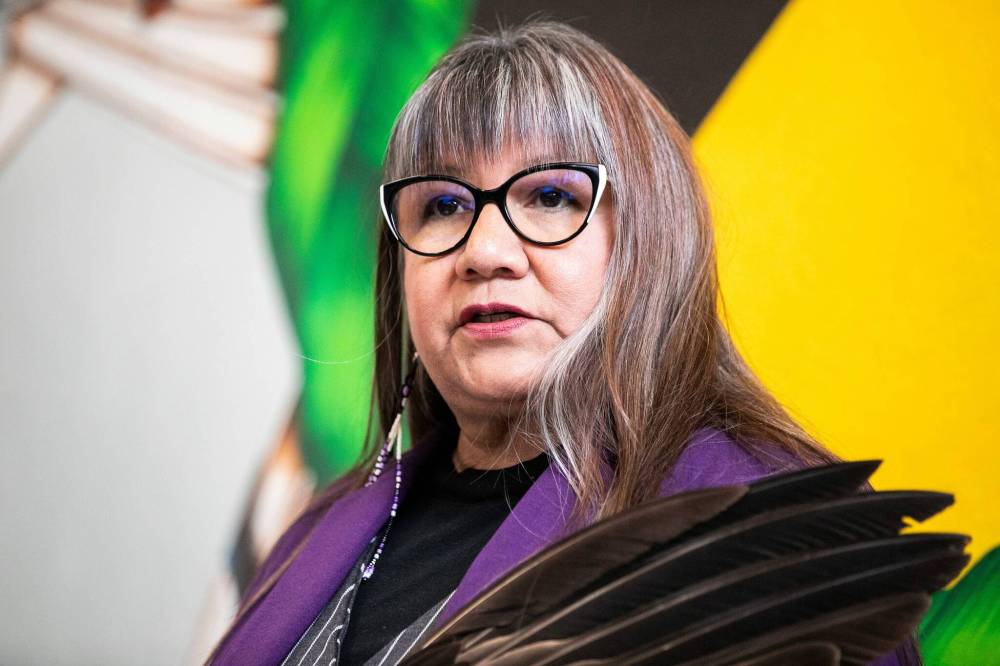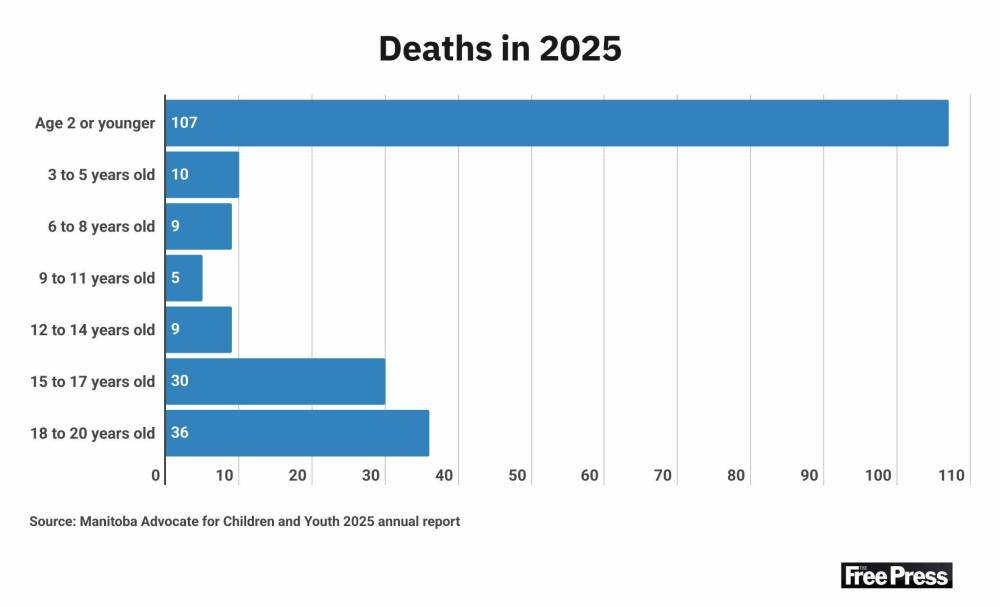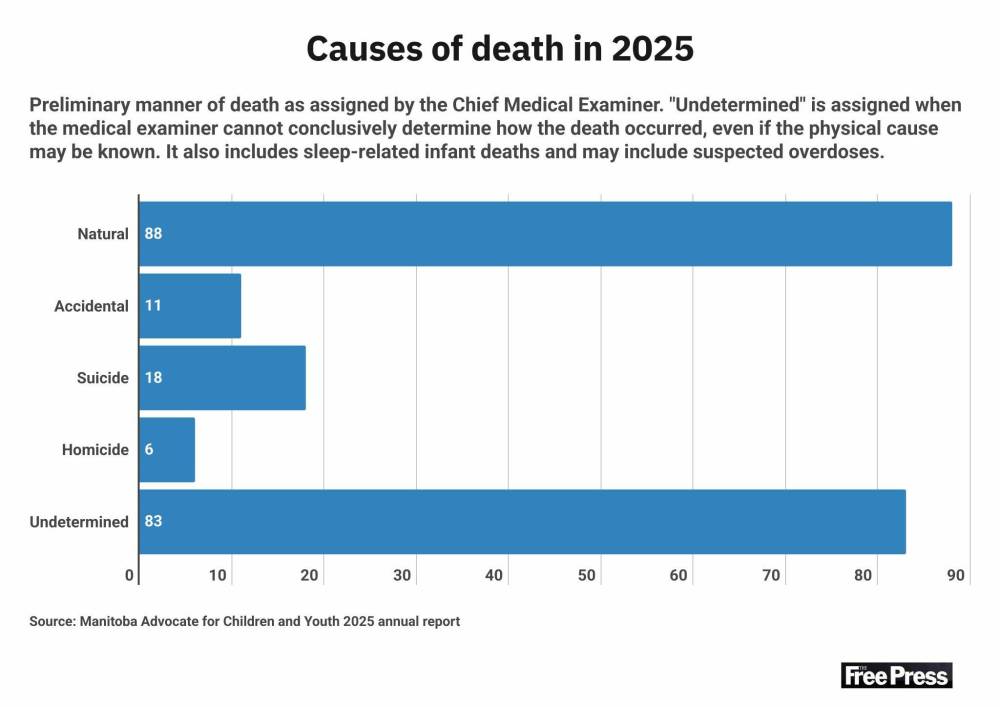Youth need addiction, mental health strategies
Children’s advocate calls on province for more support
Advertisement
Read this article for free:
or
Already have an account? Log in here »
To continue reading, please subscribe:
Monthly Digital Subscription
$0 for the first 4 weeks*
- Enjoy unlimited reading on winnipegfreepress.com
- Read the E-Edition, our digital replica newspaper
- Access News Break, our award-winning app
- Play interactive puzzles
*No charge for 4 weeks then price increases to the regular rate of $19.95 plus GST every four weeks. Offer available to new and qualified returning subscribers only. Cancel any time.
Monthly Digital Subscription
$4.99/week*
- Enjoy unlimited reading on winnipegfreepress.com
- Read the E-Edition, our digital replica newspaper
- Access News Break, our award-winning app
- Play interactive puzzles
*Billed as $19.95 plus GST every four weeks. Cancel any time.
To continue reading, please subscribe:
Add Free Press access to your Brandon Sun subscription for only an additional
$1 for the first 4 weeks*
*Your next subscription payment will increase by $1.00 and you will be charged $16.99 plus GST for four weeks. After four weeks, your payment will increase to $23.99 plus GST every four weeks.
Read unlimited articles for free today:
or
Already have an account? Log in here »
As politicians debate proposed legislation to detain adults in the throes of a meth psychosis for up to 72 hours, Manitoba’s children’s advocate wants to know how minors will be treated.
“When they talk about Bill 48 with respect to detaining intoxicated people for 72 hours or so, there is no youth-specific need addressed in that bill,” Sherry Gott said Wednesday.
The Protective Detention and Care of Intoxicated Persons Act would replace the Intoxicated Persons Detention Act, which allows for the 24-hour involuntary detention of people intoxicated by alcohol. It proposes 20 spaces for people to detox from the effects of drugs under medical supervision, but doesn’t say anything about youth.

MIKAELA MACKENZIE / FREE PRESS FILES
Manitoba Advocate for Children and Youth, Sherry Gott: “When they talk about Bill 48 with respect to detaining intoxicated people for 72 hours or so, there is no youth-specific need addressed in that bill.”
The Manitoba Foster Parents Association echoed the advocate’s concern.
“The legislation makes no clear reference to children or youth, despite the fact that many young people, especially those in or from care, struggle with addiction, trauma, homelessness and mental-health crises,” said president Jamie Pfau.
“I think there needs to be an updated strategy or an updated resource for youth, and I don’t think they should be mixed in with adults,” Gott said in an interview. “There needs to be a youth-specific focus,” the advocate said after the release of her annual report that includes data about child deaths and serious injuries.
“When you look at my report, many of those injuries are alcohol- and drug-related,” she said Wednesday.
The report specifies “substance misuse” was the second-most-reported risk factor for children and youth who had serious injuries. It points to the need for better-equipped youth addiction services to address substance use and its related harms.
“The province’s current youth addiction system is ill-equipped to meet the complex and co-occurring needs of many young people, and is fraught with persistent and long-standing gaps and barriers to available and accessible services,” the advocate said in a news release.
The gaps expose a major rift between government commitment and action, she said, adding she has called for the government to update its strategies and create new policies to support children with disabilities, mental health needs or addiction,” Gott said.

“We also know that there needs to be these specialized placements and facilities that meet the needs of those kids with high-risk needs,” she said. “The mental health and addiction — substance use issues — need to be addressed by the government.”
She said she’s been waiting for the province to roll out a strategy.
Addictions Minister Bernadette Smith told reporters her department is working collaboratively to address addictions and substance “misuse” and “supporting and meeting youth where they’re at.”
When asked if there is a plan for a protective care centre that offers 72-hour holds for youth gripped in a meth psychosis, Smith said her department is working with all of its serving agencies and the children’s advocate. “We want to make sure that youth are getting the supports that they need.”
Smith said she has no concerns about a minor being taken to a protective care centre at 190 Disraeli Fwy. when it opens — which, according to the minister — could be as soon as Saturday.
“We know that Manitobans need the supports and we’re working towards that,” she said ahead of debate over Tory amendments to Bill 48.
“We just need the Tories to pass this bill to ensure that this facility opens, so that Manitobans get the support they need and we can keep our community safe,” Smith said.

The advocate’s annual report shows a decrease in the number of child, youth and young adults deaths from previous years.
“One child death is too many,” said Gott. While there were fewer deaths, the number whose manner of death was undetermined increased — to 83 from 71 one year earlier.
The advocate attributed the increase to suspected overdose deaths and sleep-related infant deaths.
The report said the advocate’s office is dealing with increasingly complex cases, with more young people needing services from multiple systems.
It’s taken steps to “Indigenize” its advocacy, 83 per cent of which involves Indigenous children and youth. That includes public education throughout the province to let people know about the role of the advocate.
“We need to provide that outreach to make sure that children and youth rights are met,” Gott said.
They connected with 3,007 youth through engagement workshops, received 3,018 requests for advocacy services and reached 604,079 social media accounts through a digital awareness campaign, the annual reports says.

Families Minister Nahanni Fontaine, who was not available Wednesday, issued a prepared statement saying the government appreciates the advocate’s work “which helps guide our work to protect vulnerable young people.”
She said the province is expanding programs, including Huddle youth mental health hubs, and after-school and mentoring programs.
carol.sanders@freepress.mb.ca

Carol Sanders
Legislature reporter
Carol Sanders is a reporter at the Free Press legislature bureau. The former general assignment reporter and copy editor joined the paper in 1997. Read more about Carol.
Every piece of reporting Carol produces is reviewed by an editing team before it is posted online or published in print — part of the Free Press‘s tradition, since 1872, of producing reliable independent journalism. Read more about Free Press’s history and mandate, and learn how our newsroom operates.
Our newsroom depends on a growing audience of readers to power our journalism. If you are not a paid reader, please consider becoming a subscriber.
Our newsroom depends on its audience of readers to power our journalism. Thank you for your support.
History
Updated on Thursday, October 30, 2025 11:01 AM CDT: Corrects word to Indigenize





